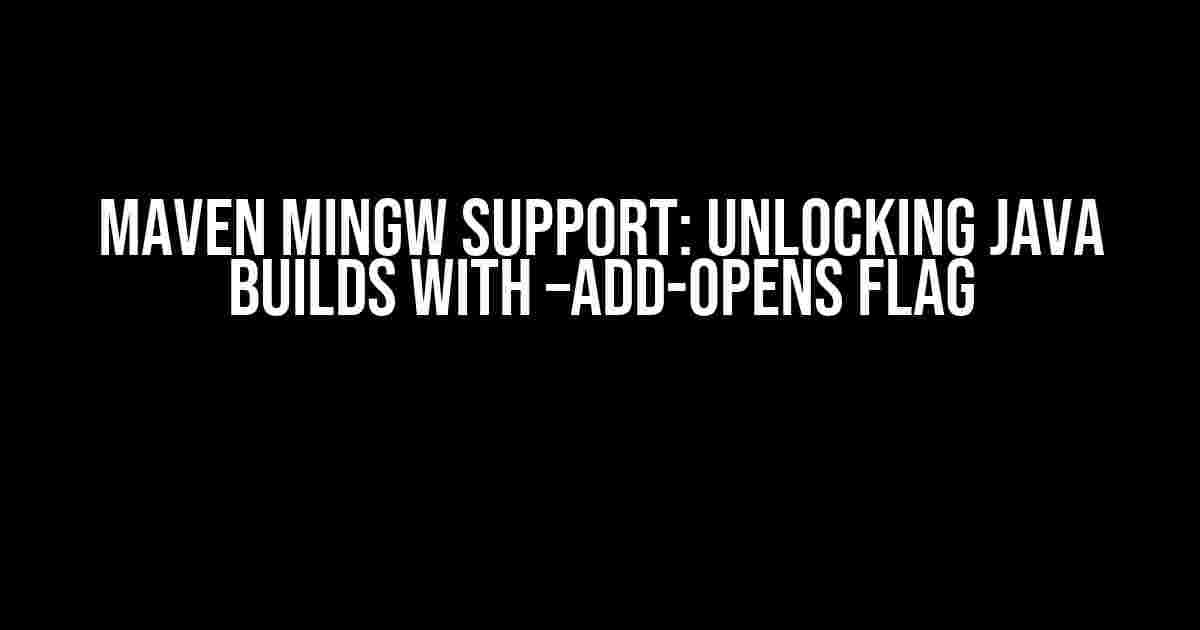Are you tired of encountering errors when trying to build Java projects with Maven on MINGW platforms? Do you find yourself stuck in a rut, searching for solutions that seem to elude you? Fear not, dear developer! In this article, we’ll shed light on the mystical realm of Maven MINGW support and guide you through the process of resolving the infamous “--add-opens java.base/java.lang=ALL-UNNAMED” requirement.
What is MINGW?
Before we dive into the world of Maven and its MINGW support, let’s take a brief detour to understand what MINGW is. MINGW (Minimalist GNU for Windows) is a native Windows port of the GNU Compiler Collection (GCC) and other development tools. It provides a Unix-like environment on Windows, allowing developers to compile and run Unix-based applications with ease.
Maven MINGW Support Issues
When building Java projects with Maven on MINGW platforms, you might encounter errors related to module access. This is because MINGW uses a different runtime environment than traditional Unix-based systems, which can lead to compatibility issues. One such issue is the requirement for the “--add-opens java.base/java.lang=ALL-UNNAMED” flag.
The –add-opens Flag Explained
The “--add-opens” flag is a JVM argument used to grant access to internal Java modules. In Java 9 and later, the “java.lang” module is not accessible by default. To allow Maven to access this module, you need to add the “--add-opens java.base/java.lang=ALL-UNNAMED” flag to your Maven configuration.
--add-opens java.base/java.lang=ALL-UNNAMED
This flag opens the “java.lang” module, allowing Maven to access its internal classes and methods. The “ALL-UNNAMED” part specifies that all unnamed modules should be allowed to access the “java.lang” module.
Configuring Maven MINGW Support
Now that you understand the essence of the “--add-opens” flag, let’s explore the various ways to configure Maven MINGW support.
Method 1: Using the Maven Compiler Plugin
One way to add the “--add-opens” flag is by configuring the Maven Compiler Plugin. You can do this by adding the following code to your pom.xml file:
<build>
<plugins>
<plugin>
<groupId>org.apache.maven.plugins</groupId>
<artifactId>maven-compiler-plugin</artifactId>
<version>3.8.0</version>
<configuration>
<compilerArgs>
<arg>--add-opens</arg>
<arg>java.base/java.lang=ALL-UNNAMED</arg>
</compilerArgs>
</configuration>
</plugin>
</plugins>
</build>
This configuration adds the “--add-opens” flag to the Maven Compiler Plugin, allowing Maven to access the “java.lang” module.
Method 2: Using the Maven Surefire Plugin
Another way to add the “--add-opens” flag is by configuring the Maven Surefire Plugin. You can do this by adding the following code to your pom.xml file:
<build>
<plugins>
<plugin>
<groupId>org.apache.maven.plugins</groupId>
<artifactId>maven-surefire-plugin</artifactId>
<version>3.0.0-M5</version>
<configuration>
<argLine>--add-opens java.base/java.lang=ALL-UNNAMED</argLine>
</configuration>
</plugin>
</plugins>
</build>
This configuration adds the “--add-opens” flag to the Maven Surefire Plugin, allowing Maven to access the “java.lang” module during test execution.
Method 3: Using the MAVEN_OPTS Variable
You can also add the “--add-opens” flag by setting the MAVEN_OPTS environment variable. This variable allows you to pass JVM arguments to Maven.
set MAVEN_OPTS="--add-opens java.base/java.lang=ALL-UNNAMED"
This method is useful when you need to run Maven from the command line. Simply set the MAVEN_OPTS variable before running your Maven command, and the “--add-opens” flag will be applied.
Troubleshooting Maven MINGW Support Issues
Even with the “--add-opens” flag in place, you might still encounter issues with Maven MINGW support. Here are some common problems and their solutions:
| Issue | Solution |
|---|---|
Error: “java.lang.module.InvalidModuleDescriptorException“ |
Check that the “--add-opens” flag is correctly configured. Verify that the flag is added to the Maven Compiler Plugin or Maven Surefire Plugin. |
Error: “java.lang.RuntimeException: Unable to get module info“ |
Ensure that the MAVEN_OPTS variable is set correctly. Try resetting the variable and re-running Maven. |
Error: “java.lang.ClassNotFoundException“ |
Check that the required dependencies are correctly configured in your pom.xml file. Verify that the dependencies are installed and up-to-date. |
Conclusion
In this article, we’ve explored the world of Maven MINGW support and delved into the mysteries of the “--add-opens java.base/java.lang=ALL-UNNAMED” flag. By following the methods outlined above, you should be able to configure Maven to work seamlessly with MINGW platforms.
Remember, troubleshooting is an essential part of the development process. If you encounter issues with Maven MINGW support, refer to the troubleshooting section for guidance. With patience and persistence, you’ll be building Java projects with Maven on MINGW platforms in no time!
Happy coding!
Frequently Asked Question
Got stuck with the Maven MINGW support error? Worry not! We’ve got you covered with these 5 FAQs that’ll get you back on track in no time!
Q: What does the error “Maven MINGW support requires –add-opens java.base/java.lang=ALL-UNNAMED” even mean?
A: This error occurs when Maven, a popular build tool, is trying to use the MINGW (Minimalist GNU for Windows) compiler, but it’s facing issues due to Java modules not being accessible. The error message is asking you to add an extra flag to allow Maven to access the required Java modules.
Q: Why do I need to add the –add-opens flag in the first place?
A: The –add-opens flag is required because Java 9 and later versions introduced the concept of modules, which have stricter access control. The flag allows Maven to access the java.lang module, which is necessary for the MINGW compiler to work properly.
Q: How do I add the –add-opens flag to my Maven command?
A: You can add the flag by modifying your Maven command to include the following option: “-Djdk.Release.add-opens=java.base/java.lang=ALL-UNNAMED”. For example, your command might look like this: “mvn package -Djdk.Release.add-opens=java.base/java.lang=ALL-UNNAMED”.
Q: I’m using an IDE like Eclipse or IntelliJ. How do I add the flag in my project settings?
A: The process varies depending on your IDE. In Eclipse, go to Run Configurations > Arguments > VM arguments and add the flag. In IntelliJ, go to Settings > Build, Execution, Deployment > Maven > Runner > VM Options and add the flag. Refer to your IDE’s documentation for more detailed instructions.
Q: Will adding the –add-opens flag affect my project’s build process or performance?
A: No, adding the flag will not significantly impact your project’s build process or performance. It’s a necessary fix to allow Maven to access the required Java modules, ensuring that your build process runs smoothly.



